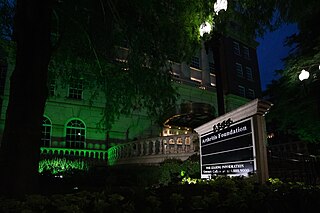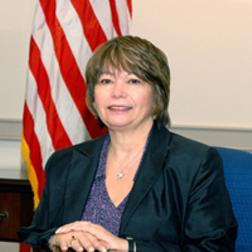The responsible fatherhood movement encourages fathers to be involved in their children's lives and advocates for societal support of such involvement.
Maximus Inc. is an American government services company, with global operations in countries including the United States, Australia, Canada, and the United Kingdom. The company contracts with government agencies to provide services to manage and administer government-sponsored programs. Maximus provides administration and other services for Medicaid, Medicare, health care reform, welfare-to-work, and student loan servicing among other government programs. The company is based in Tysons, Virginia, has 34,300 employees and a reported annual revenue of $3.46 billion in fiscal year 2020.

The American juvenile justice system is the primary system used to handle minors who are convicted of criminal offenses. The system is composed of a federal and many separate state, territorial, and local jurisdictions, with states and the federal government sharing sovereign police power under the common authority of the United States Constitution. The juvenile justice system intervenes in delinquent behavior through police, court, and correctional involvement, with the goal of rehabilitation. Youth and their guardians can face a variety of consequences including probation, community service, youth court, youth incarceration and alternative schooling. The juvenile justice system, similar to the adult system, operates from a belief that intervening early in delinquent behavior will deter adolescents from engaging in criminal behavior as adults.
NORC at the University of Chicago is one of the largest independent social research organizations in the United States. Established in 1941 as the National Opinion Research Center, its corporate headquarters is located in downtown Chicago, with offices in several other locations throughout the United States. Organized as an independent corporation, more than half its board comes from faculty and administration of the University of Chicago. It also jointly staffs some of the university's academic research centers.
Child protective services (CPS) is the name of an agency in many states of the United States responsible for providing child protection, which includes responding to reports of child abuse or neglect. Some states use other names, often attempting to reflect more family-centered practices, such as department of children and family services (DCFS). CPS is also sometimes known by the name of department of social services, though these terms more often have a broader meaning.

The Arthritis Foundation is a nonprofit organization that is dedicated to addressing the needs of people living with arthritis in the United States. There are nearly 60 million adults and 300,000 children living with arthritis, the nation's leading cause of disability. The Foundation works to provide information and resources, access to care, advancements in science and community connections.
Casey Family Programs (CFP) is a national operating foundation focused on foster care and child welfare.
Juvenile delinquency in the United States refers to crimes committed by children or young people, particularly those under the age of eighteen.

Children At Risk is a 501(c)(3) non-profit organization that drives changes for children through research, education, and influencing public policy. Founded in the year of 1989 in Houston, Texas and with an office opened in North Texas in 2011, the organization focuses on the well-being of children and educates legislators on the importance of solving children's issues while at the same time focusing on a variety of issues, and the primary issues are human trafficking, food insecurity, education, and parenting. Children At Risk also has a North Texas office in Dallas, Texas. Some of Children At Risk's previous primary issues were juvenile justice, mental health, and Latino children.

Gladys Carrión is an Adjunct Research Scholar with Columbia University's Justice Lab. She was the Commissioner of the New York City Administration for Children's Services (ACS) until 2017 and a nationally recognized advocate for improving child well-being.

The United States incarcerates more of its youth than any other country in the world through the juvenile courts and the adult criminal justice system, which reflects the larger trends in incarceration practices in the United States. In 2010, approximately 70,800 juveniles were incarcerated in youth detention facilities alone. As of 2006, approximately 500,000 youth were brought to detention centers in a given year. This data does not reflect juveniles tried as adults. As of 2013, around 40% were incarcerated in privatized, for-profit facilities.
Voices for America's Children(Voices) was a 501(c)(3) non-profit organization located in Washington, DC. Voices is a U.S. nonpartisan, national organization that advocates for the well-being of children at the federal, state and local levels of government. It addresses areas such as early childhood education, health, juvenile justice, child welfare, tax and budget decisions. It was renamed from National Association of Child Advocates in 2003.
The Making Connections Survey is a neighborhood-based, longitudinal and cross-sectional survey funded by the Annie E. Casey Foundation. It serves as an evaluation of a larger initiative supported by the foundation and was designed to collect data measuring how neighborhood change affects the well-being of children. The Making Connections Survey was conducted by National Opinion Research Center at the University of Chicago between 2002 and 2011 with residents in ten low-income communities across the United States. The final survey dataset includes responses from roughly 28,000 interviews at three points in time.
Jerome Gilbert Miller was an American social worker, academic and public sector corrections administrator, who was an authority on the reform of juvenile and adult corrections systems. He was a prominent advocate for alternatives to incarceration for offenders as well as for the de-institutionalization of individuals with developmental disabilities. His career involved university teaching, administration of juvenile justice services for three states, clinical work with offenders and advocacy for systemic change in public sector correctional services. Miller's work first drew national attention for his leadership in closing several juvenile reformatories in Massachusetts in the early 1970s. Miller went on to emerge as a prominent national advocate, administrator and educator working for systemic change in public sector corrections and disability service delivery systems. He was the co-founder of the National Center on Institutions and Alternatives.

KVC Health Systems, Inc. (KVC) is a private, nonprofit child welfare and behavioral healthcare organization. When Kansas became the first U.S. state to privatize its child welfare services in 1996, it selected KVC to be one of the nonprofit service providers. As of 2021, KVC Kansas is the only nonprofit organization that has continually been a foster care case management provider for 25 years KVC has provided foster care case management services longer than any other private organization in the U.S.
The Kansas Health Foundation (KHF) is a nonprofit organization based in Wichita, Kansas, U.S., but is statewide in its focus and grantmaking abilities. Its mission is to improve public health and wellness throughout Kansas. Through grantmaking, the foundation works to "improve the health of all Kansans by promoting health and wellness in schools, neighborhoods and workplaces; to grow leaders in communities; inspire decision makers; and act as a voice for healthy public policy in Kansas for generations."
Chapin Hall at the University of Chicago is a policy research institution at the University of Chicago that focuses on child welfare and family well-being. Chapin Hall is funded through social service systems, foundations, and non-profit organizations. The organization's focus areas include child welfare and foster care systems, youth homelessness, and community capacity to support children, youth, and families. Chapin Hall is an affiliated research center of the University of Chicago.

Casebook PBC is a US cloud computing public-benefit corporation headquartered in New York City. Incubated by the Annie E. Casey Foundation, the company initially developed child welfare solutions and has since expanded to provide a SaaS platform servicing the whole of [Human Services] organizations.
The Kids Count Data Book is an annual publication of the Annie E. Casey Foundation—at times in cooperation with the Center for the Study of Social Policy—reporting comparative statistics on child welfare in each of the 50 states of the United States of America.
The Family First Prevention Services Act (FFPSA) was included in the Bipartisan Budget Act of 2018 (HR 1892) and signed by President Donald Trump on Feb. 9, 2018. While the primary purpose of the legislation at the time was keeping the government funded for six more weeks to pave the way for a long-term budget deal, the included FFPSA marked a significant change in states' ability to prioritize and fund prevention services in child welfare.






